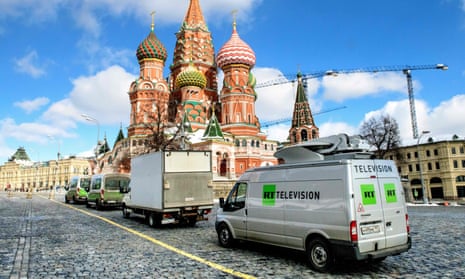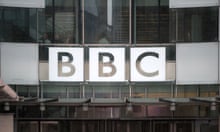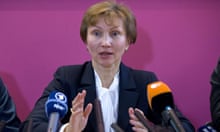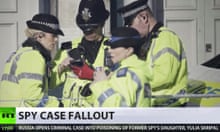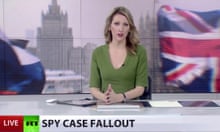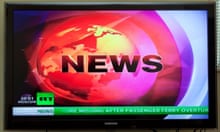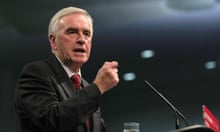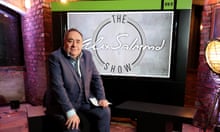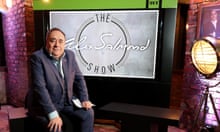According to its website, RT news (slogan: “Question more”) aims to acquaint an international audience with the Russian viewpoint by providing an alternative perspective on major global events.
Measured against those objectives, and based on 24 hours spent watching its coverage of a story that has plunged relations with Moscow towards a new post-cold war low, you would have to say it is doing a pretty good job.
“May will expel 23 Russian diplomats – even though police have yet to announce any specific suspects,” ran one headline on Thursday. Britain’s behaviour was “illegal, immoral and prevents a proper investigation – which may indeed be the point”, said a commentator on Friday.
The Kremlin-funded channel, formerly Russia Today, broadcasts 30-minute news bulletins from its Moscow studios every hour. Unsurprisingly, this weeks’ have been dominated by the Salisbury novichok nerve agent attack on Sergei and Yulia Skripal.
Breaking news – from the UN row between the Russian, UK and US ambassadors andthe “nasty words” of the defence secretary, Gavin Williamson, to allegations by the Russian foreign minister, Sergei Lavrov, that the UK was in breach of international treaties – was generally served up straight.
But then came the comment and analysis. Most striking for its determination to fulfil the channel’s mission – and for the skilful way it co-opted a prominent UK voice – was an “unanswered questions” segment that ran across bulletins on Thursday.
“An attack by the Kremlin, on UK soil,” began the fresh-faced journalist Daniel Hawkins in dramatic fashion. “For Downing Street, it seems the case is as good as closed. Russia is the culprit – no questions. Or … are there?”
The questions Hawkins had in mind came, rather handily, from the Labour leader, Jeremy Corbyn, speaking in the Commons: had May requested evidence from Moscow? Had a sample of the nerve agent been subjected to high-resolution trace analysis? Had the government responded to Russia’s demand for a sample?
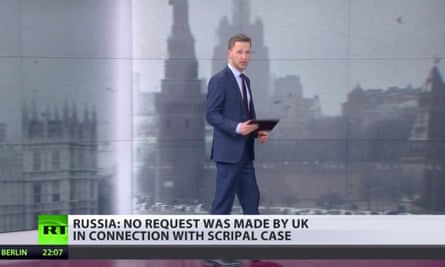
The first was neatly answered with a clip of Lavrov saying Moscow had received no formal request for anything, so Britain was just “pulling political stunts”.
No answers had been forthcoming to Corbyn’s second question either, Hawkins noted – though that had not stopped May claiming there was enough evidence to blame the Russian government: “Guilty as charged.”
This despite the fact, he added, that the Organisation for the Prohibition of Chemical Weapons had confirmed last year that Russia had “concluded the destruction of its entire chemical weapons stockpile”, and that “not only Russia had access” to post-Soviet research labs and scientists.
Nor had Britain responded to Russia’s request for a sample, Hawkins said, before asking a question of his own: “Why such secrecy, if this is such an open and shut case?”
And how, knowing the diplomatic fallout, could “committing a heinous act on foreign soil” conceivably benefit the Kremlin? The former London mayor Ken Livingstone popped up, usefully, to ask exactly the same question.
In its bulletins on Friday, the channel examined the “theories” Britain and its allies were advancing in lieu of proof: Moscow’s “arrogant response”; the fact there was “no plausible alternative explanation”; and an alleged pattern of “reckless behaviour” by Russia.
Picking up on a term used by the foreign secretary, Boris Johnson, correspondent Igor Zhdanov explained that the west appeared to have detected a “blatant Russian-ness” about the attack, using examples from James Bond to William Shakespeare to illustrate his point.
TimelinePoisoned umbrellas and polonium: Russian-linked UK deaths
Show
In one of the most chilling episodes of the cold war, the Bulgarian dissident was poisoned with a specially adapted umbrella on Waterloo Bridge. As he waited for a bus, Markov felt a sharp prick in his leg. The opposition activist, who was an irritant to the communist government of Bulgaria, died three days later. A deadly pellet containing ricin was found in his skin. His unknown assassin is thought to have been from the secret services in Bulgaria.
The fatal poisoning of the former FSB officer sparked an international incident. Litvinenko fell ill after drinking tea laced with radioactive polonium. He met his killers in a bar of the Millennium hotel in Mayfair. The pair were Andrei Lugovoi – a former KGB officer turned businessman, who is now a deputy in Russia’s state Duma – and Dmitry Kovtun, a childhood friend of Lugovoi’s from a Soviet military family. Putin denied all involvement and refused to extradite either of the killers.
The exiled Russian banker survived an attempt on his life as he got out of a cab in east London. He was shot four times with a silenced pistol. He had been involved in a bitter dispute with two former business partners.
The businessman collapsed while running near his home in Surrey. Traces of a chemical that can be found in the poisonous plant gelsemium were later found in his stomach. Before his death, Perepilichnyy was helping a specialist investment firm uncover a $230m Russian money-laundering operation, a pre-inquest hearing was told. Hermitage Capital Management claimed that Perepilichnyy could have been deliberately killed for helping it uncover the scam involving Russian officials. He may have eaten a popular Russian dish containing the herb sorrel on the day of his death, which could have been poisoned.
The exiled billionaire was found hanged in an apparent suicide after he had spent more than decade waging a high-profile media battle against his one-time protege Putin. A coroner recorded an open verdict after hearing conflicting expert evidence about the way he died. A pathologist who conducted a postmortem examination on the businessman’s body said he could not rule out murder.
An associate of Berezovsky whom he helped to launder money, he was found impaled on railings after he fell from a fourth-floor flat in central London. A coroner ruled that there was insufficient evidence of suicide. But Young, who was sent to prison in January 2013 for repeatedly refusing to reveal his finances during a divorce row, told his partner he was going to jump out of the window moments before he was found.
Sergei Skripal and his daughter Yulia were were found unconscious on a bench in the Maltings shopping centre in Salisbury after 'suspected exposure to an unknown substance' which was later identified as chemical weapon novichok.
In the aftermath Theresa May blamed Vladimir Putin and expelled 23 Russian diplomats who were suspected of spying. Two Russian men using the identities Ruslan Boshirov and Alexander Petrov were named as suspects. They appeared on Russian TV to protest their innocence.
The Skripals survived. However a local woman, Dawn Sturgess, died after spraying novichok on her wrists from a fake Nina Ricci perfume bottle converted into a dispenser, which had been recovered from a skip by her partner Charlie Rowley.
In fact, he said, given the CIA’s poisoning attempts and how Britain – in fiction, at least – had been “honing its skills in the death by chemicals business” since Macbeth, you may as easily talk of “blatant American-ness or Englishness”.
“When it comes to Russia and proof,” he concluded, “international laws are being substituted for hashtags: #Russiadidit, or #highlylikely.”
RT’s expert interviewees generally appear chosen for their pro-Kremlin views. Many “believe it’s not Russia, but the UK, that’s breaking the rules”, the presenter Nikki Aaron said on Thursday. A case in point was Earl Rasmussen of the little-known Washington thinktank the Eurasia Center.
Russia had offered to cooperate, Rasmussen said, “which makes complete sense to me. Why wouldn’t you want to cooperate? Sometimes, if you’re trying to hide something or shift the narrative in a certain direction, maybe you wouldn’t ... Unfortunately, I don’t think this looks very professional of the UK.”
Presented as an “international affairs commenter”, Marko Gašić criticised Britain’s refusal to hand Moscow a sample of the nerve agent as “utterly scandalous”. He is best known in the UK as a prominent spin doctor for the genocidal Bosnian Serb regime during the Balkan conflict in the 1990s.
Russia’s ambassador to London, Alexander Yakovenko, told the channel in an intensely trailed half-hour interview on Friday that the UK saw in the Salisbury attack “a possibility to launch an anti-Russian campaign” aimed at “diverting attention from Brexit”.
The UK “cannot provide proofs”, Yakovenko said. “But Britain is in new circumstances, it is trying to find a new place in the world ... So this is the scenario that was written in London, but it’s a shortsighted scenario because, in the long run, Britain will have to explain what is behind all these things in Salisbury.”
On one point at least, the channel was bang on the nail. Commenting on Williamson’s startling injunction to Russia to “go away and shut up”, RT’s London correspondent, Anastasia Churkina, said the situation was “beginning to feel a little bit surreal. This kind of language is really unusual in diplomatic circles … if you expect to be taken seriously.”
